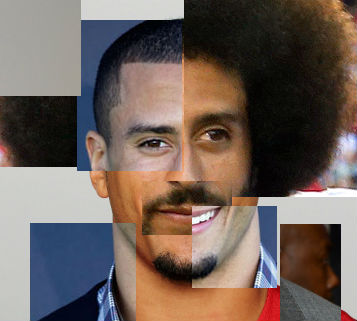By Michael McQuillan
Police shootings, school segregation and inner city economic deprivation demand frank talk and hard work across the color line. Senator Cory Booker and the New York Giants, inspired by San Francisco 49er Colin Kaepernick’s pregame protests, recently showed that can happen. “I am not going to stand up to show pride in a flag for a country that oppresses people of color,” he said. “To me this is bigger than football and it would be selfish on my part to look the other way.” Withstanding public censure while risking endorsement losses, benching or trade, the former Super Bowl standout has in a sense scored a touchdown.
Ripples of hope now cross the country. From New York Knicks star Carmelo Anthony’s Los Angeles police and youth forum to one Miami Dolphins Michael Scott and Jelani Jenkins sponsored, to Hall of Fame legend Michael Jordan’s million dollar donations to the NAACP Legal Defense and Education Fund and the International Association of Chiefs of Police’s new Institute on Community-Police Relations, the often called for but never constructed “national conversation on race” has begun.
College and high school athletes as well as other NFL players have joined Kaepernick’s protest. “We know what we’re doing; we made a conscious decision,” Aurora Central High School (Colorado) quarterback Jalil Grimes told the New York Times. “We see police do us wrong. We see our teachers give up on us and expect us to fail. We’ve always seen this. Once we saw somebody else stand up against it we just fell in line.”
In New York, Katiatu Diallo is the mother of the African immigrant an NYPD undercover team shot to death in his South Bronx doorway at night in 1999 because he allegedly fit a suspect’s description. Diallo now offers to meet that unit’s lead officer, Kenneth Boss, who fired five of forty-one bullets that night. Boss, a current Aviation Squad Sergeant, was awarded last month for rappelling from a helicopter to rescue boaters stranded overnight on a Jamaica Bay island. “If he’s saving lives and being honored for that, that’s good. If he’s going to do that for the rest of his time as a police officer, that’s good,” the Daily News reported she said. Boss’ redemptive police service while repenting the past could earn her forgiveness and they could both model racial reconciliation for others.
Dialogue, action and change develop when individual creativity turns collective. That’s how Richmond’s Hope in the Cities, Hartford’s Everyday Democracy and the William Winter Center at the University of Mississippi started. These nonprofit organizations have long led reconciliation work without headlines or all-out financial backing although President Bill Clinton’s One America Advisory Board found their methods effective. Might private foundations and grantmakers in federal agencies embrace them? “It’s time to find solutions,” the Dolphins’ Scott said in the St. Louis Post-Dispatch. “People aren’t crying wolf – this is our reality. People feel their lives are worth less than those who aren’t of color.”
Richmond’s Office of Community Wealth-Building, policing roundtables and school funding fairness grew from racial dialogues guided by Hope in the Cities. Its Unity Walk through historic Jim Crow and slave trade sites led to “whole truth” antebellum era exhibits in museums and schools. Everyday Democracy has dealt with how race impacts birth outcomes and poverty in urban, rural and reservation communities. The Winter Center helped Gulf Coast residents recover and rebuild after the Katrina and Deepwater Horizon disasters. Kaepernick’s stance will spur similar work.
Recent events have left people across America asking hard questions about whether we are still a ‘house divided’…
Government officials dwell in abstractions while people lead themselves. “Recent events have left people across America asking hard questions about whether we are still a ‘house divided,’” Hillary Clinton claimed at the Illinois state House where Abraham Lincoln spoke. She later pledged to address “structural racism” as president without saying how. She tweeted that police shootings of black men “have become unbearable and must be made intolerable” without explaining how legislative measures, executive orders or use of the “bully pulpit” would help.
Colin Kaepernick’s impact proves we can all make a difference. Senator Robert Kennedy told South Africa’s antiapartheid activists in 1966 that “each time a man stands up for an ideal or strikes out against injustice he sends forth a tiny ripple of hope, and crossing each other from a million centers of energy and daring those ripples build a current which can sweep down the mightiest walls of oppression and resistance.”
This is a defining moment. It can happen here.
Michael McQuillan, contributes to the History News Network’s coverage of police-community relations and served on the NYPD Training Advisory Council.
Illustration by Danny Tisdale.
Become a Harlem Insider!
By submitting this form, you are consenting to receive marketing emails from: Harlem World Magazine, 2521 1/2 west 42nd street, Los Angeles, CA, 90008, https://www.harlemworldmagazine.com. You can revoke your consent to receive emails at any time by using the SafeUnsubscribe® link, found at the bottom of every email. Emails are serviced by Constant Contact









